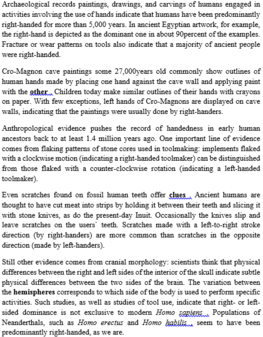Read the following passage and mark the letter A, B, C, or D on your answer sheet to indicate the correct answer to each of the questions from 35 to 42.
What unusual or unique biological train led to the remarkable diversification and unchallenged success of the ants for over 50 million years? The answer appears to be that they were the first group of predatory eusocial insects that both lived and foraged primarily in the soil and in rotting vegetation on the ground. Eusocial refers to a form of insect society characterized by specialization of tasks and cooperative care of the young; it is rare among insects. Richly organized colonies of the land made possible by eusociality enjoy several key advantages over solitary individuals.
Under most circumstances groups of workers are better able to forage for food and defend the nest, because they can switch from individual to group response and back again swiftly and according to need. When a food object or nest intruder is too large for one individual to handle, nestmates can be quickly assembled by alarm or recruitment signals. Equally important is the fact that the execution of multiple-step tasks is accomplished in a series-parallel sequence. That is, individual ants can specialize in particular steps, moving from one object (such as a larva to be fed) to another (a second larva to be fed). They do not need to carry each task to completion from start to finish - for example, to check the larva first, then collect the food, then feed the larva. Hence, if each link in the chain has many workers in attendance, a sense directed at any particular object is less likely to fail. Moreover, ants specializing in particular labor categories typically constitute a caste specialized by age or body form or both. There has been some documentation of the superiority in performance and net energetic yield of various castes for their modal tasks, although careful experimental studies are still relatively few.
What makes ants unusual in the company of eusocial insects is the fact that they are the only eusocial predators (predators are animals that capture and feed on other animals) occupying the soil and ground litter. The eusocial termites live in the same places as ants and also have wingless workers, but they feed almost exclusively on dead vegetation.
(Source: TOEFL Reading)
Which of the following questions does the passage primarily answer?
A. Why have ants been able to thrive for such a long time?
B. What are the differences between social and solitary insects?
C. How do individual ants adapt to specialized tasks?
D. Why are ants predators?




Câu hỏi nào dưới đây mà bài đọc tập trung trả lời?
A. Tại sao kiến có khả năng sinh tồn và phát triển trong khoảng thời gian dài như vậy?
B. Sự khác biệt giữa côn trùng xã hội và côn trùng có tập tính sống 1 mình?
C. Bản thân mỗi con kiến thích nghi như thế nào với nhiệm vụ được chuyên môn hóa?
D. Tại sao kiến là động vật ăn thịt?
Thông tin: What unusual or unique biological train led to the remarkable diversification and unchallenged success of the ants for over 50 million years?
Tạm dịch: Con tàu sinh học lạ lùng nào đã dẫn đến sự đa dạng hóa đáng kể và sự thành công không thể chối cãi của lũ kiến trong vòng hơn 50 triệu năm qua?
Chọn A